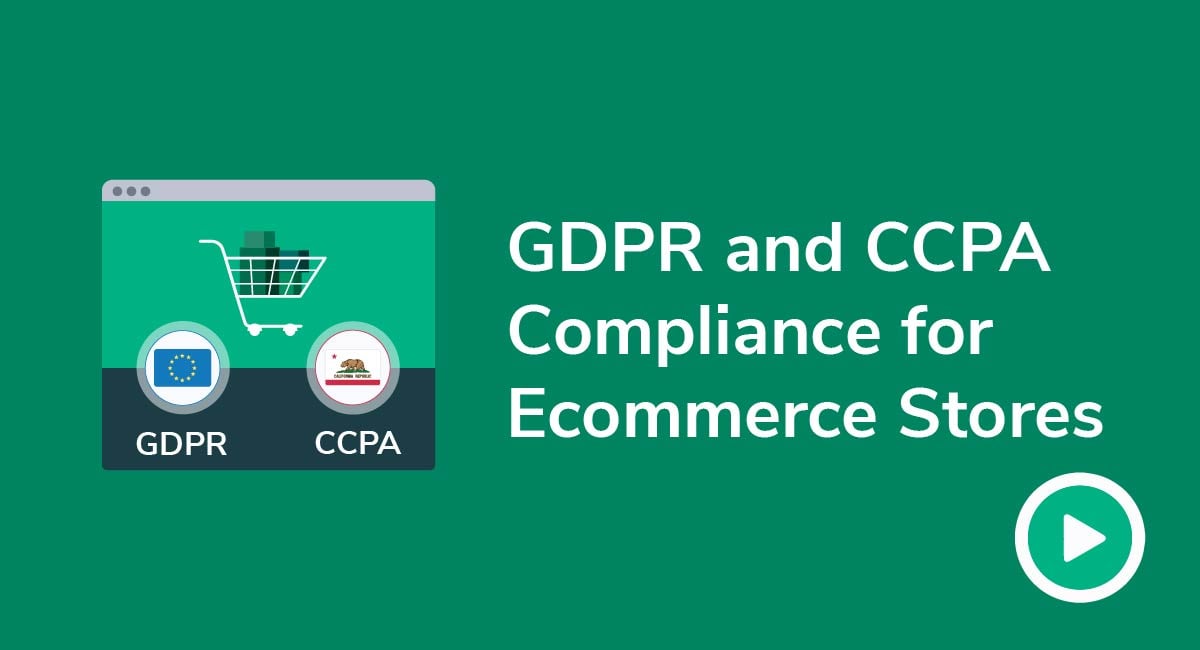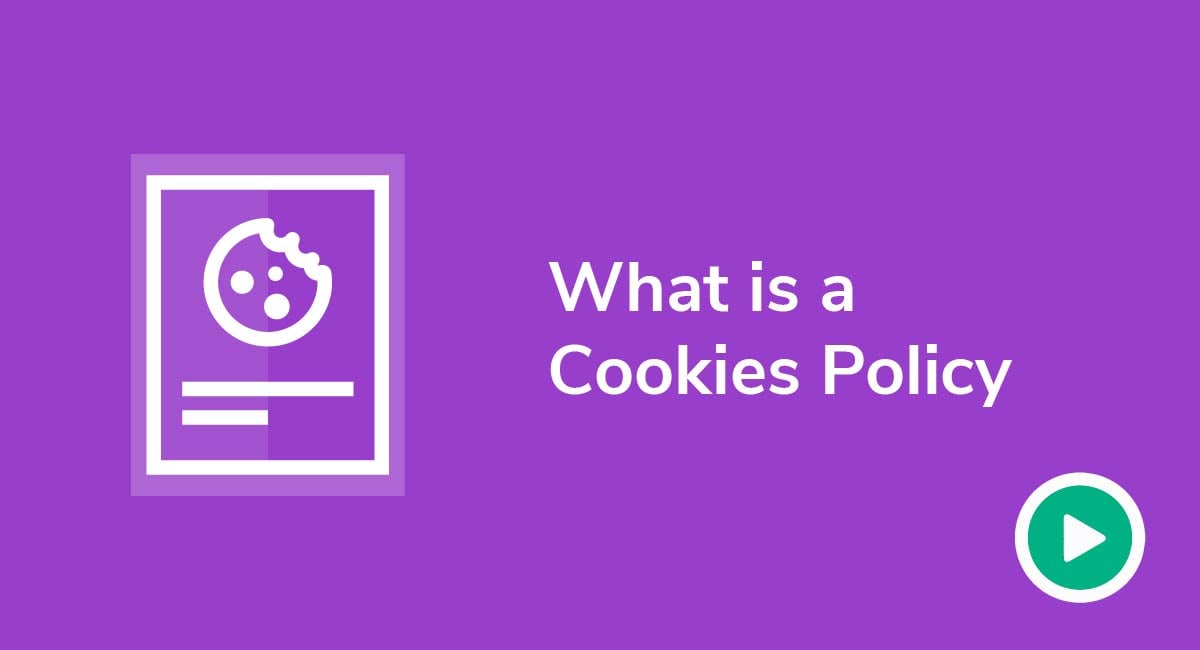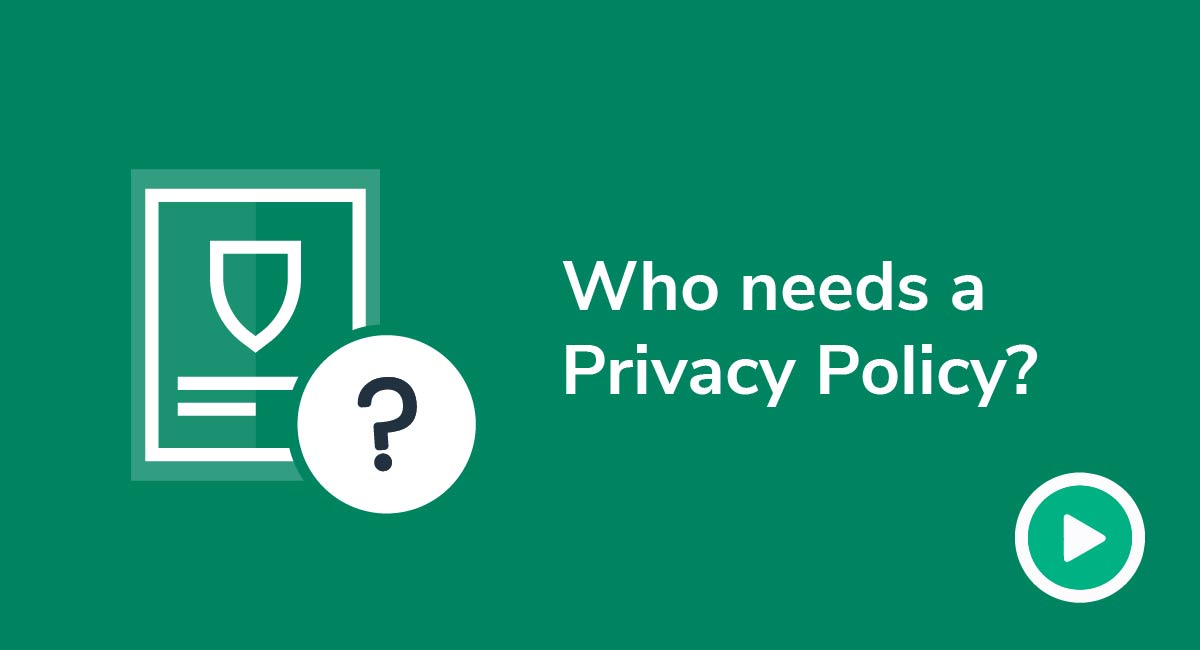Video: Privacy Policy vs. Terms & Conditions
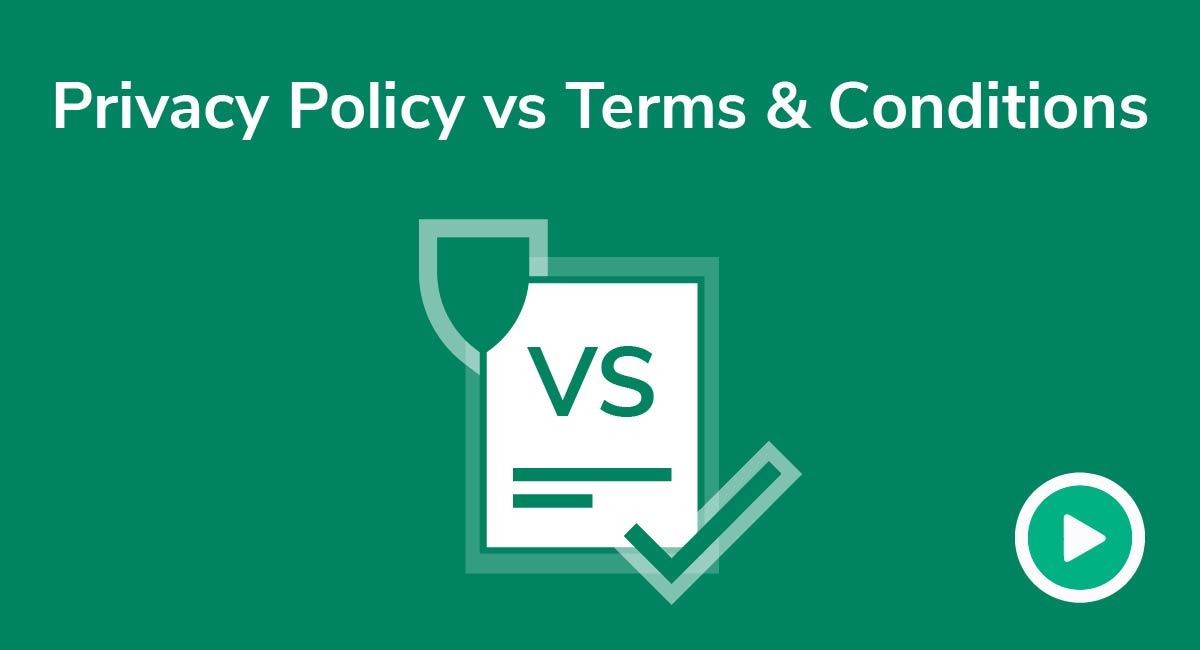
If you've wanted to find out what's the difference between a Privacy Policy and Terms and Conditions agreement, then you've come to the right place.
In today's video, we'll cover what a Privacy Policy is, what a Terms and Conditions agreement is, the difference between the two, and how you can generate a Privacy Policy or Terms and Conditions agreement.
So if you're interested in learning more, then stick around.
- 1. What are Privacy Policies and Terms and Conditions?
- 1.1. Firstly, let's talk a bit about Privacy Policies and why you might need one
- 2. Now that we've talked about Privacy Policies, let's talk about what a Terms and Conditions Agreement is
- 3. So what's the difference between a Privacy Policy and a Terms and Conditions agreement?
- 3.1. In summary, Privacy Policies:
- 3.2. Whereas a Terms and Conditions Agreement:
Hey everyone, it's Heleana here. Welcome to Privacy Policies, the place where you can generate custom-made Privacy Policies in seconds to help keep your business safe.
So let's get straight into it.
What are Privacy Policies and Terms and Conditions?
Privacy Policies and Terms and Conditions (T&C) agreements are both, as the names imply, legally binding contracts.
The main difference between these two types of agreements is this:
A Privacy Policy agreement exists to protect your clients, whereas a Terms and Conditions agreement exists to protect you, the company.
But there's a lot more to it than just that.
Let's take a look at each agreement and see what they accomplish for you and your customers.
Firstly, let's talk a bit about Privacy Policies and why you might need one
Privacy Policies weren't always required for business owners. Only as of recently have software developers and anyone else gathering personal data or private information from clients become legally obligated to have Privacy Policies.
This requirement has come from regulations like the European Union's General Data Protection Regulation and California's Online Privacy Protection Act that aim to protect personal information.
We have an entire video dedicated to Privacy Policies and the GDPR, so if you're interested in watching it, I'll have it linked in the description box below.
Privacy regulations around the world are put into place to protect citizens' privacy. So, if you have an online presence where you collect people's personal data, you'll be legally obligated to have a Privacy Policy in place in order to protect customers from regulation-protected countries.
There are quite a few reasons why a Privacy Policy is a good thing to have for your business, but here are just a few of them:
-
A carefully drafted, easy to understand Privacy Policy inspires trust in clients and encourages them to sign up with you.
It makes users feel safe and cared for, and this inspires faith in your product.
-
A Privacy Policy teaches or reminds people that they have rights worth protecting.
-
A Privacy Policy clearly lays out where your boundaries are when it comes to the data you collect and how you plan to use it.
This will come in handy if one of your users one day decides that you had no right to show them third-party advertisements based on information gathered from their account.
With a good Privacy Policy agreement you can show that you gave them every opportunity to know what they were getting into, and that they were free to decline to use your app as well as to change or remove their information.
-
And finally, a good Privacy Policy will protect you from fines and other penalties.
This may not seem like such a big deal, but in a world where people assume it's okay to pirate information and sell it to the highest bidder, everyone loses, including you. So it's important that people know and are reminded of their rights.
Not only must you be honest and clear about your privacy practices to potential users, but you must also be transparent to government authorities. These authorities can demand that companies be ready to show them not only a solid Privacy Policy that's prominently posted to the world, but also require that the company show that they have strong security measures in place to protect client information from hackers.
Now that we've talked about Privacy Policies, let's talk about what a Terms and Conditions Agreement is
A Terms and Conditions agreement, also known as "Terms of Service" or "Terms of Use," tells the customer what will be legally required of them if they subscribe to your service or download and use your mobile app.
Simply put, a Terms and Conditions agreement gives you a legal leg to stand on in the event of abuse or litigation. While not required by law like a Privacy Policy is, a Terms and Conditions agreement is incredibly useful to businesses.
This agreement is the perfect receptacle for all the information you need to share with users regarding copyright, licensing rights, rules of use, and limits of liability.
Just as a Privacy Policy establishes the frontiers of information collection and use, a Terms and Conditions agreement explains to potential users what will and will not be tolerated by the business and what will be done if the client breaches these rules, for example, terminating their account, etc.
Since there aren't any laws regulating the way T&C agreements need to be written or presented, we recommend that you follow best practices.
A Terms and Conditions agreement might include the following:
- A disclaimer regarding the company's liability
- Usage restrictions and prohibited activities while using the site
- What the company is prepared to do in cases of abuse of the platform, such as terminating an account
- Copyright and intellectual property information
- Warranty disclaimers
- Terms for billing
- Subscription agreements
- And more
Your Terms and Conditions agreement can also reference your Privacy Policy or include a link to it, but it's important to keep the Privacy Policy and the T&C as separate legal agreements.
So what's the difference between a Privacy Policy and a Terms and Conditions agreement?
- The main purpose of a Terms and Conditions agreement is to protect you, the business, whereas the main purpose of a Privacy Policy is to protect your client, the consumer.
- Having a Privacy Policy is required by law, but having Terms and Conditions agreement is not.
- Privacy Policies deal with the privacy of a consumer's data, how it's collected and what you will do with it. Terms and Conditions are used as a guideline for users to follow when using your product, service, app, website, etc.
In summary, Privacy Policies:
- Inform users about what personal data and information you'll be collecting, and how
- Explain why you're collecting this information, what you're going to do with it, and which third parties you may be sharing it with
- Tell the users which security measures are in place to ensure the security of their information
- And finally, they inform users of their rights under relevant privacy laws, and how these rights can be exercised
Need a Privacy Policy? Our Privacy Policy Generator will help you create a custom policy that you can use on your website and mobile app. Just follow these few easy steps:
- Click on "Start creating your Privacy Policy" on our website.
- Select the platforms where your Privacy Policy will be used and go to the next step.
- Add information about your business: your website and/or app.
- Select the country:
- Answer the questions from our wizard relating to what type of information you collect from your users.
-
Enter your email address where you'd like your Privacy Policy sent and click "Generate".

And you're done! Now you can copy or link to your hosted Privacy Policy.




Whereas a Terms and Conditions Agreement:
- Explains how your product is allowed to be used
- Gives warranty disclaimers
- Discloses billing information
- Explains under what circumstances a user's account might be terminated
- Shares copyright information
- And finally, gives requirements for user-generated content
Need Terms and Conditions for your business? We can help you generate a customized Terms and Conditions agreement in around two-three minutes for free. Try our Terms and Conditions Generator and just follow these steps:
- Click on the "Create your Terms and Conditions today" button.
- At Step 1, select the where will you use your Terms & Conditions and click "Next step":
- Add information about your business:
- Select the country and continue to the "Next step":
- Answer the questions about your business practices and click "Next step" when finished:
-
Enter your email address where you'd like your agreement sent and click "Generate."

You're done! Now you'll be able to instantly access and download your new agreement.
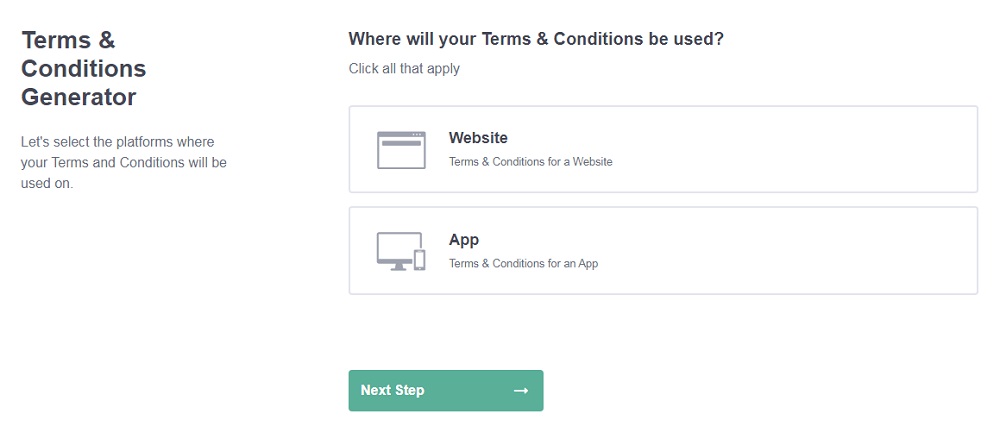
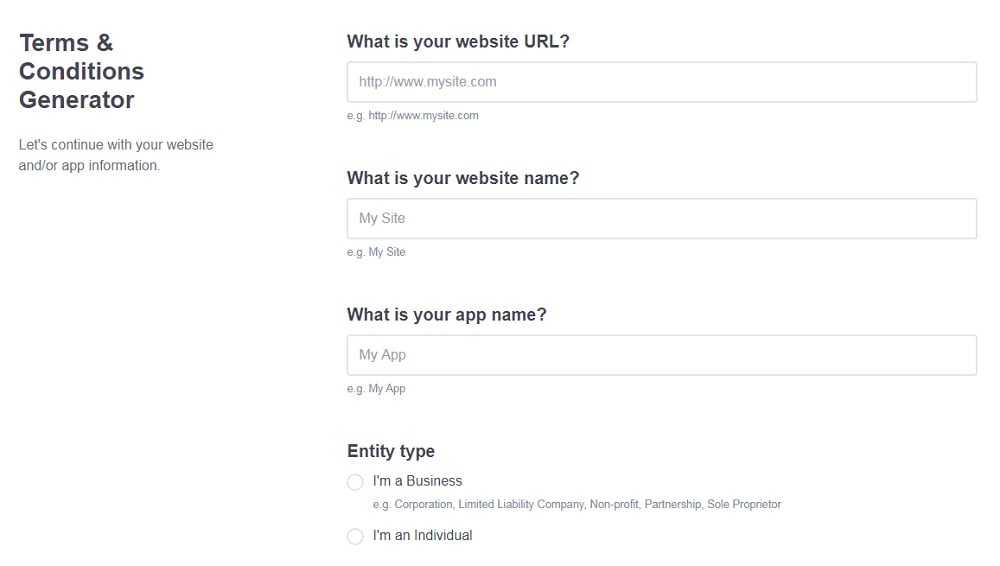
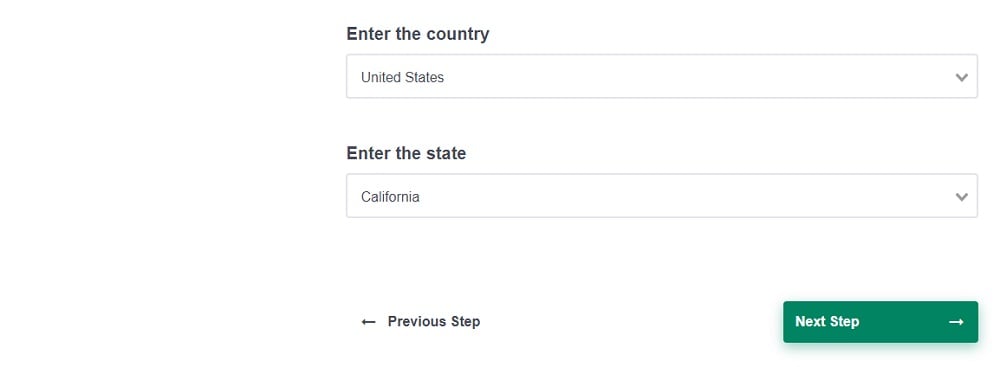
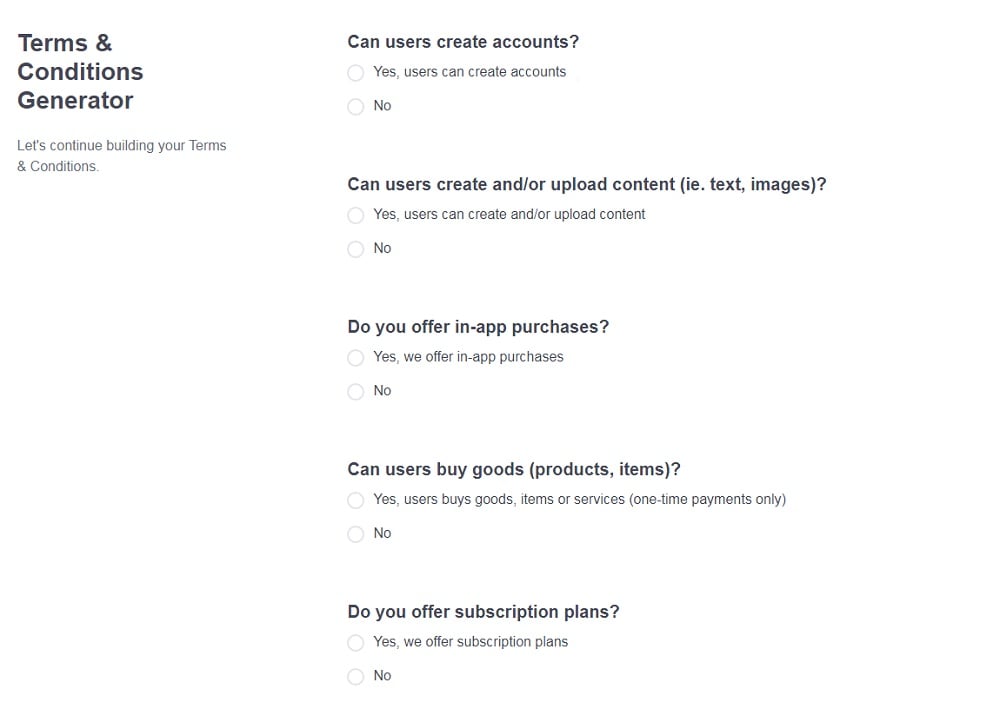
If you need to create a Privacy Policy or Terms and Conditions agreement for your business, but you don't know how to make one, we've got you covered. We have generators for both Privacy Policies and Terms and Conditions agreements.
Just go to our website PrivacyPolicies.com and use our Privacy Policy Generator or Terms and Conditions Generator. Simply fill out your website's information and you'll have your agreements ready within 2 to 3 minutes. And the best part? It's all for free. Give it a try now!
We hope that you found this video on Privacy Policy versus Terms and Conditions helpful and informative.
If you have any more questions related to this topic that we didn't happen to touch on, please leave them in the comments below and we'll get back to you as soon as we can.
Thanks for watching, don't forget to subscribe so you can stay up to date with all our latest videos, and we will see you in our next video.
